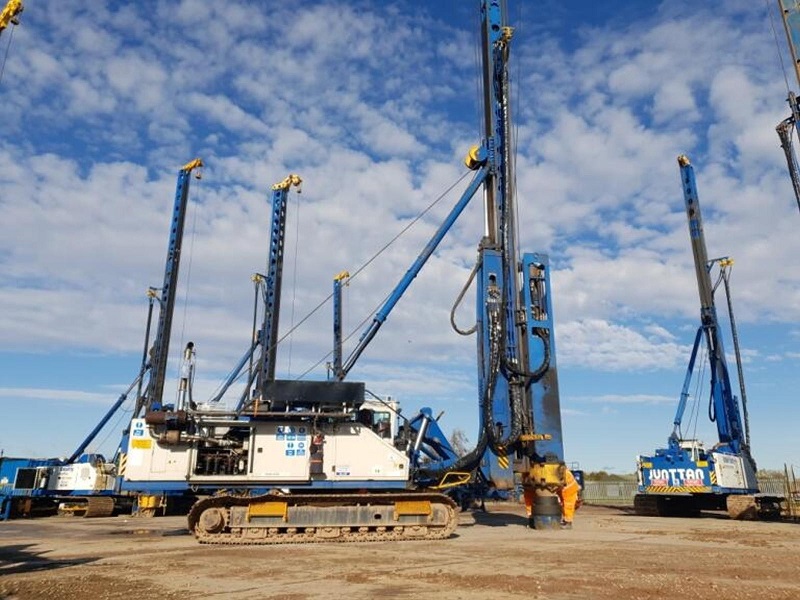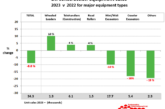
HS2’s Non-Road Mobile Machinery (NRMM) retrofit innovation adds exhaust technology to existing engine systems on plant machinery
The initiative will upgrade the equipment to the latest EU Stage V engine class, leading to cleaner air around construction sites. The six-month pilot of the retrofit solution was carried out by UK company Eminox on a Balfour Beatty Stage IIIA piling rig (Junttan PM20). It was tested by Imperial College London (Centre for Low Emission Construction) and Emissions Analytics, and has just been validated by the Energy Saving Trust, providing certainty for the sector and making it available industry-wide.
HS2 has set strict (NRMM) emissions requirements, with all plant operating needing to meet at least EU Stage IV requirements from 2022. This innovation will deliver the first EU Stage V equivalent retrofit solution in Europe – taking the piling rig to the lowest emissions level possible.
This retrofit solution gives HS2 and its suppliers confidence that existing NRMM can be successfully retrofitted to meet HS2’s 2022 NRMM criteria at a fraction of the cost of purchasing new equipment. For example, it enables an older £1.5M piece of equipment to be converted into a lower emissions product for a fraction of the cost. For HS2 this could potentially mean a £300m saving across the project.
Unlike on-road exhaust emissions reduction retrofit technologies, which typically use compressed air from the existing system the new technology removes particulates, hydrocarbons, carbon monoxide and nitrous oxide emissions using new airless dosing technology. This is the first of its kind and the innovative technology will also benefit users of NRMM working in other clean air zones such as Greater London and Birmingham.
HS2’s Director of Environment Peter Miller said: “HS2 will be low carbon in operation and we’re also minimising the project’s carbon emissions as we build by utilising new low carbon materials and technology. This is one of many projects we’re developing with partners to cut carbon across the HS2 project, and bring wider benefits for the whole construction industry.”
“Working in partnership with Imperial College London and our contractors CSJV and BBV, this ground breaking innovation has allowed us to better understand plant emissions on site, create an NRMM plan to reduce worker exposure and community impacts, and develop technology to further reduce emissions in and around our construction sites.”
HS2 Minister Andrew Stephenson said: “We are going to enormous efforts to ensure that HS2 is one of the most environmentally responsible infrastructure projects ever delivered in the UK.
“By cleaning up the air on construction sites, this ground-breaking technology will protect our health and the environment, all while saving millions of pounds across the project.
“As the first retrofit solution of its class in Europe, this technology will be welcomed right across the construction industry.”
Eminox’s Director of Retrofit & Aftermarket, Carlos Vicente said: “At Eminox we’re focused on helping to reduce emissions across a wide range of sectors and working on this pioneering HS2 project has enabled us to extend our leading retrofit technology from on road applications to construction equipment. Being first to market with Energy Savings Trust accreditation for non-road mobile machinery demonstrates the project’s innovation – it enables the construction industry to have new opportunities for cost-effectively reducing emissions to the lowest possible level and improving air quality across the industry.”
Daniel Marsh, Centre for Low Emission Construction, Imperial College London said: “The NRMM retrofit project has allowed us to work in partnership with key organisations to produce scientific evidence to give the construction industry the confidence to adopt new cost-effective measures to reduce machine emissions. The use of new technology will allow contractors to upgrade their most polluting machines to meet the latest emission standards and help reduce the air pollution impacts across the whole HS2 project.”
Bekir Andrews, Group Head of Sustainability & Reporting, Balfour Beatty Plc said: “Reducing emissions from plant on construction sites is a key challenge that our sector faces – it is something that we are particularly passionate about at Balfour Beatty, having recently launched our Sustainability Strategy – Building New Futures. Whilst engine standards are improving and new electric, hybrid and hydrogen solutions are starting to enter the market, there is a lot of plant and machinery that still runs on IIIA and IIIB engines. We are immensely pleased to have worked alongside HS2, Eminox and the Centre for Low Emissions Construction to develop a practical solution to improve emissions from construction sites and offer a solution for our sector.”
As the largest infrastructure project in Europe, HS2 will create huge demand for construction equipment, supporting UK manufacturers and suppliers. The project’s fleets will be a mix of new, existing and retrofitted old plant, and HS2 will also continue to promote innovative alternative fuel plant such as hydrogen, electric and solar.
A second pilot is currently underway on the larger Bauer BG30 403kW rig, to test whether larger machines within the 350kW to 550kW range can also be retrofitted, providing even more benefits to the sector.
For further information on HS2’s commitment to air quality click here








